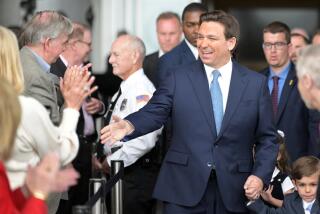White House Plays Down Quayle’s Soviet Comments
- Share via
WASHINGTON — White House officials scrambled today to reconcile skeptical remarks by Vice President Dan Quayle about Soviet foreign policy with President Bush’s optimistic assessments. “There is no policy difference” between the two, they said
“We have an Administration that is very closely aligned, but I think it’s probably not possible for people to speak literally with one voice, and there may be a difference in perspective, but there’s no difference with the policies we’re pursuing,” National Security Adviser Brent Scowcroft told reporters.
Quayle had told the Washington Post that the Kremlin’s foreign policy does not appear to have changed despite improved relations with the West.
“You’re still dealing with a totalitarian government” that wants to “create instability” in other nations, Quayle said in the interview published today.
Quayle said he “hadn’t seen any evidence of their slackening off” aid to Cuba and Nicaragua.
His comments came a day after Bush returned from his Mediterranean summit meeting with Mikhail S. Gorbachev and said that in view of developments, the West must adopt “new thinking” toward the Soviets.
“My viewpoint is the new thinking and the real reform is in the area of economics. I don’t think they’ve changed much in foreign policy,” Quayle said.
“There is no policy difference” between the two men, Scowcroft said.
He and White House Press Secretary Marlin Fitzwater pointed out that Bush remained critical of the Soviet role in Central America.
Fitzwater said that Bush and Quayle had discussed the Post interview this morning when they met but that Bush “doesn’t feel there’s any need for concern.”
Quayle has taken a tougher line in the past in his public comments on the Soviet Union than other Administration officials, and the interview contrasted with Bush’s generally upbeat assessment of the weekend’s superpower summit.
Quayle told the Post that the Soviets have “very significant interests beyond their borders and those interests create instability.
“We cannot count on the Soviets, out of the goodness of their hearts, in alleviating those tensions for us.”
Though Gorbachev has been very helpful in spurring Communist governments in Eastern Europe to reform, “I don’t view that as a matter of foreign policy as much as domestic policy,” Quayle said.
More to Read
Get the L.A. Times Politics newsletter
Deeply reported insights into legislation, politics and policy from Sacramento, Washington and beyond. In your inbox twice per week.
You may occasionally receive promotional content from the Los Angeles Times.










